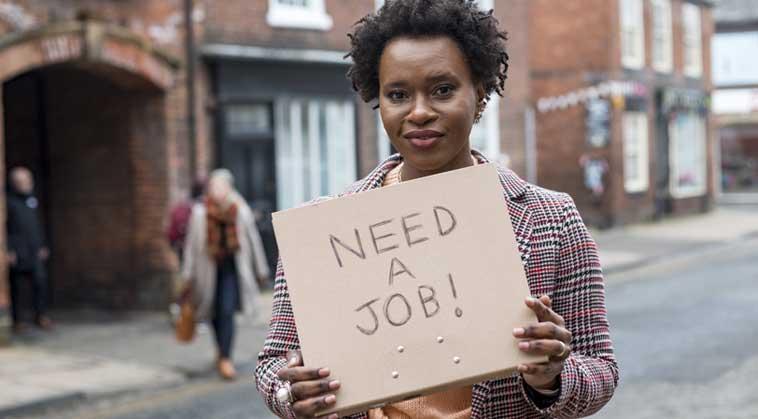Africa-Press – Lesotho. How long can you be unemployed before it looks bad? What happens if an unemployed person gives up looking for a job? What happens if you are unemployed for too long?
These are questions I came across when I was preparing to write this piece. I was looking for current data of employment/unemployment rates in Lesotho.
I traded that for a more personal take on unemployment. Therefore, this one will be written from a lived experience perspective. I have been public about my personal struggles with formal employment after I graduated from my undergrad studies.
This is not a type of ‘look at me now’, it is an invitation to others to reflect and choose to have takeaways if any of this will resonate. More so because we tend to make unemployment personal, most if not all times, it is systemic.
Also, let us be brutally honest, Unemployment in Africa is an actuality, a reality that we are forced to live with. Ideally, we were taught to plan on securing employment after completion of our studies.
Hold on a minute before breaking a sweat, even if you personally do not subscribe to employment, we are taught to plan on it. Let us go ahead and tease ourselves with this one.
At a level of family life and upbringing, a typical Mosotho mother is telling their child that they want them to be a doctor, an engineer, a lawyer, a nurse.
A farmer, a hairdresser, a tailor, a mechanic are a definite no-no! I envision a Mosotho parent holding their chest as they feel for a chair to sit, because, “Lerato u batla ho mpolaea ka pelo ka litoro tsena tsa hao tsaho loha batho meriri.
For my non-Sesotho speaking readers, this means the parent will be alluding to an early death brought about by their daughter Lerato’s ambitionless dreams of being a hairdresser.
Yes, our parents are that extreme in their remarks. Or they are that emotionally vested in seeing their children prosper. With African parents, it can be either-or. So, we can see that at a family level there are already subtle encouragers of what the African child can and cannot do for work as they grow older.
You have a grade 12 student completing their high school with 7A’s, and the subtle encourager is that they need to enroll for medicine because what else can you do with 7A’s, I wonder? The expectation that families have of their children can lead to negative effects on mental health.
How many of us have sworn to a life where we break generational curses by committing to get our families out the hood? Intention, motivation, long hours reading, graduate top of your class, check-check and check!
Employment opportunities, uhm maybe check later! The point here is that with all that encouraging from parents & preparation for the job market, some get appointed for roles, others do not.
Those that do not get appointed end up having one or two things to navigate through, including making sure their mental health does not check-out. At an academic level, it is a curriculum issue whereby a typical African school-goer is not oriented on how to make/produce.
Vocational schools tend to be looked down on because they do not guarantee a suit and tie job. The ones that are taught vocational skills, otherwise known as “mesebetsi ea matsoho” are restricted in terms of where to sell their products.
Imagine the frustration of a tailor with piles of plain t-shirts sewn with the hope of selling to companies that specialise in branded merchandise. Think about a self-made farmer with fields of potatoes, but no food store in sight to buy.
At this level, unemployment becomes an actuality beyond what the skillful farmer or tailor can control. Mind you, with the use of social media, individuals are able to market and promote their products now more than ever.
What this does is guaranteed “like, care and love” emojis from friends and connections, but no sales whatsoever. At this point I am hoping the reader realises that unemployment is not a personal problem, at least not in how it occurs in Lesotho’s context.
Fast forward to national efforts to increase employment rates by this or that number, in however many years. While I think it works, I sometimes grow curious about the number of youths that are absorbed in innovation funding programmes, in investment capital projects, or even the traditional employment of 9-5.
There are observable efforts at national level to respond to the need of eradicating poverty and promoting sustained, inclusive sustainable economic growth, full and productive employment, and decent work (SDGs 1 & 8).
Unfortunately, the results are not immediate for everyone. Which continues to make unemployment in the country a structural and systemic problem. Now, for those that are faced with unemployment it becomes murky to know how to overcome what sometimes feels like a permanent personal problem.
You worry about not doing enough. You worry about being lazy. You worry about the next door neighbor doing things to block your success. You worry about whether it is your destiny that you are not generating an income when your friend just purchased a brand new SUV.
Me and my background in mental health want to bet that these worries will eat away at your peace, and they will negatively impact your ability to enjoy a normal life.
More so when it feels personal that you are not doing enough. We tell new graduates to keep applying for jobs, but we do not follow it up with how they should process the rejection because it is inevitable.
There is an employment pool but not big enough for all of us. I am someone that knows a thing or two about mental health. I have zero knowledge of how we can respond to unemployment in Lesotho.
I also know that someone can seek counselling to talk about their challenges with being unemployed, but how can they even afford to pay for their sessions, I wonder!
We talk of cognitive restructuring in the field of psychology, we invite you to change the way you think about the situation, substitute negative thoughts with positive thoughts. We ask you to unlearn unhelpful thinking styles in forms of “all or nothing thinking.
” When you come to me and express emotional exhaustion of having sent out so many application letters, I will encourage you to keep applying, but what else can be the alternative to not applying?
“Re loana ntoa e thata” when it comes to unemployment.
We are at a disadvantage where dynamics of whether we get absorbed in the pool or not is largely dependent on selection criteria. Sometimes we meet criteria, other times we do not.
If you are a Mosotho young adult facing this challenge, keep on keeping on! Personally, I have adopted a non-victim approach to unemployment, it has heightened my creativity to think of what else I can do in lieu of employment. Cole Sprouse said, “I am not a victim of my circumstances. . . we trade trauma for wisdom, that’s what we do.”
For More News And Analysis About Lesotho Follow Africa-Press






